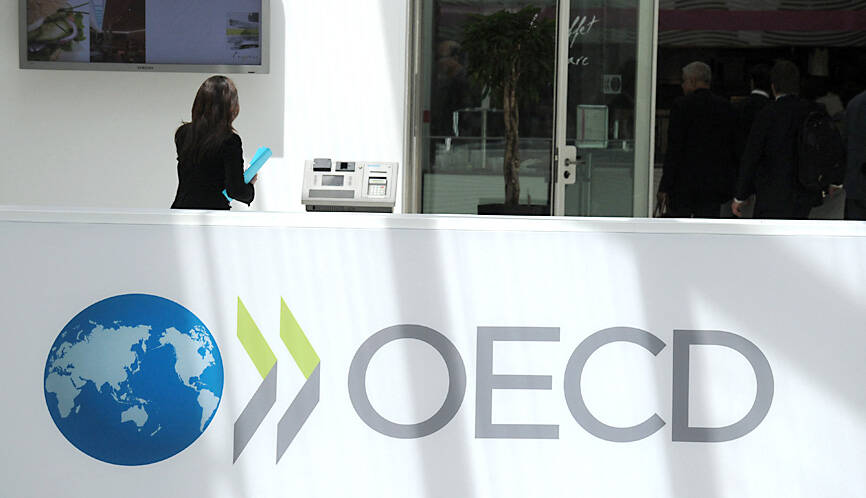The Organisation for Economic Co-operation and Development (OECD) yesterday warned that protectionist trade measures pose a major risk to the world economy, just weeks before US president-elect Donald Trump is to return to the White House next month.
The Paris-based OECD did not name Trump in its updated analysis of the world economy, but it was abundantly clear that the organization was warning about Trump’s possible tariff measures on US trading partners.
While the OECD raised its global growth forecast to 3.3 percent next year, it said that “greater trade protectionism, particularly from the largest economies” poses a “downside risk” along with geopolitical tensions and high public debts.

Photo: AFP
“Increases in trade-restrictive measures could raise costs and prices, deter investment, weaken innovation and ultimately lower growth,” the OECD said in its economic outlook.
“Further increases in global trade restrictions would add to import prices, raise production costs for businesses and reduce living standards for consumers,” it added.
A recent study by the Roland Berger consultancy calculated the cost of the US measures, and likely countermeasures by China and the EU, at more than US$2.1 trillion through 2029.
Trump is far from the only risk in terms of protectionist measures. A spat has also broken out between Brussels and Beijing after the EU imposed import tariffs on Chinese electric vehicles. China has retaliated with tariffs on EU brandy, including cognac.
The OECD sees the US economy expanding 2.4 percent next year, up from its September forecast of 1.6 percent growth. It also raised its forecast for the UK’s growth next year 0.5 percentage points to 1.7 percent due to higher public spending planned by the new Labour Party government.
China’s economy is expected to expand 4.7 percent next year, an increase of 0.2 percentage points, while India’s growth forecast was raised 0.1 percentage points to 6.9 percent.
However, France and Germany saw 0.3 percentage point cuts to their growth forecasts to 0.9 percent and 0.7 percent respectively, as both countries face political crises amid mounting fiscal pressure, the OECD said.

Taiwan will prioritize the development of silicon photonics by taking advantage of its strength in the semiconductor industry to build another shield to protect the local economy, National Development Council (NDC) Minister Paul Liu (劉鏡清) said yesterday. Speaking at a meeting of the legislature’s Economics Committee, Liu said Taiwan already has the artificial intelligence (AI) industry as a shield, after the semiconductor industry, to safeguard the country, and is looking at new unique fields to build more economic shields. While Taiwan will further strengthen its existing shields, over the longer term, the country is determined to focus on such potential segments as

UNCERTAINTY: Innolux activated a stringent supply chain management mechanism, as it did during the COVID-19 pandemic, to ensure optimal inventory levels for customers Flat-panel display makers AUO Corp (友達) and Innolux Corp (群創) yesterday said that about 12 to 20 percent of their display business is at risk of potential US tariffs and that they would relocate production or shipment destinations to mitigate the levies’ effects. US tariffs would have a direct impact of US$200 million on AUO’s revenue, company chairman Paul Peng (彭雙浪) told reporters on the sidelines of the Touch Taiwan trade show in Taipei yesterday. That would make up about 12 percent of the company’s overall revenue. To cope with the tariff uncertainty, AUO plans to allocate its production to manufacturing facilities in

COLLABORATION: Given Taiwan’s key position in global supply chains, the US firm is discussing strategies with local partners and clients to deal with global uncertainties Advanced Micro Devices Inc (AMD) yesterday said it is meeting with local ecosystem partners, including Taiwan Semiconductor Manufacturing Co (TSMC, 台積電), to discuss strategies, including long-term manufacturing, to navigate uncertainties such as US tariffs, as Taiwan occupies an important position in global supply chains. AMD chief executive officer Lisa Su (蘇姿丰) told reporters that Taiwan is an important part of the chip designer’s ecosystem and she is discussing with partners and customers in Taiwan to forge strong collaborations on different areas during this critical period. AMD has just become the first artificial-intelligence (AI) server chip customer of TSMC to utilize its advanced

Chizuko Kimura has become the first female sushi chef in the world to win a Michelin star, fulfilling a promise she made to her dying husband to continue his legacy. The 54-year-old Japanese chef regained the Michelin star her late husband, Shunei Kimura, won three years ago for their Sushi Shunei restaurant in Paris. For Shunei Kimura, the star was a dream come true. However, the joy was short-lived. He died from cancer just three months later in June 2022. He was 65. The following year, the restaurant in the heart of Montmartre lost its star rating. Chizuko Kimura insisted that the new star is still down